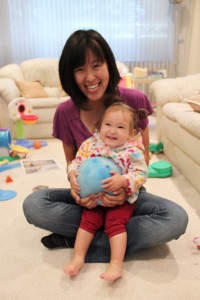Consultant Spotlight: Vanessa
The consultant we would like to highlight for you this month is Senior Behavioral Consultant Vanessa Neufeld, M.A., BCBA. Vanessa has over ten years of experience working with children diagnosed with ASD. She completed her undergraduate degree in Psychology and Counselling at Simon Fraser University and her Masters in Special Education at UBC. Vanessa is the proud mother of two-year-old Natallie and is expecting baby number two any day now.
We caught up with Vanessa to talk about the theme of this month’s newsletter – transitions.
Why did you start working with children with autism spectrum disorders?
When I started my undergrad degree, I had initially wanted to be a teacher but soon realized I didn’t like teaching a big group of kids. My friend asked me if I wanted to work with a child who had autism and once I started working as behaviour interventionist, I realized I really enjoyed one-to-one teaching.
What is the best thing about your work as a Senior Behavioural Consultant with FCPG?
I really enjoy the broad range of families and kids I support. Although I have worked with many kids on the autism spectrum, every child I meet has their own unique characteristics and family dynamics. I enjoy being able to use my knowledge from my previous years of experience in the field to help support each family.
What do you find most challenging?
Sometimes working within the limited amount of autism funding can be challenging. Some families require more intensive intervention and it is challenging when there aren’t enough financial resources for increased hours of intervention. Similarly, when children turn 6 and the autism funding is decreased, it is challenging when both the family and I think it would be in the child’s best interest to continue the program but there just isn’t the financial resources for the family to continue. I do my best with encouraging the family to save up for continued intervention and applying for global funding but sometimes it just isn’t enough.
If you could share only one piece of wisdom with a family of a child with autism, what would it be?
Don’t compare your child to other children, even other children on the autism spectrum. Each child will reach milestones in their own time. I often remind parents to celebrate the little successes that their child has achieved. It’s important to take time to celebrate every accomplishment before pushing your child to reach the next goal.
This month on our blog and in our newsletter, we’re talking about transitions. Can you tell us why it’s important for families to be prepared for school transitions?
The more families know about school transitions, the more they can prepare their child for the big change. This can be just informally talking about going to a new school, taking your child to visit the new school, or reading books about going to a new school. Also, the more families know what to expect, the more families can advocate for their child. Every child deserves to have a meaningful education experience and learning about what the school should provide can help parents get their child the services that he/she deserves.
In your opinion, what are some things that are important for families to keep in mind as they prepare for transition periods?
A lot of children with autism do not cope well with sudden change so making the transition as smooth and predictable as possible will be helpful. Making visuals for what to expect (e.g., daily schedule) and talking a lot about the upcoming change will help make things more predictable. It’s also important to remember that it is OK if your child takes some time to adjust to the change. Change can be scary and learning a new routine can take time.
How can you, as a Family Centred Practices Group consultant, help the families you work with through transitions?
Consultants can help by preparing the child and family for the transition period. This means helping the child understand the upcoming transition in a way that is meaningful to the child. This could be through the use of visuals like making Boardmaker™ symbols to depict a new school schedule or individualized Social Stories™. Consultants can brainstorm with the family to create a plan that includes antecedent strategies that will help the child cope well with the change, teach the child new skills like emotional regulation that will help him/her cope with stress or anxiety related to the transition and also behaviour management strategies if the child does display problem behaviours during the transition period.
And last, but not least: Do you have anything else you’d like to share with us?
Everyone, including me, sometimes finds change a bit scary. I am temporarily transitioning out of my role as senior consultant since I’ll be having my second child any day now. It’s hard to let go of the familiar routine I had established and the wonderful families I support. I worry about transitions just like everyone does – in my case, the transition into being a mother of two and eventually going back to work with FCPG. I try to give myself the advice I give to the families I work with and not worry too much about the future and just take things one day at a time!

